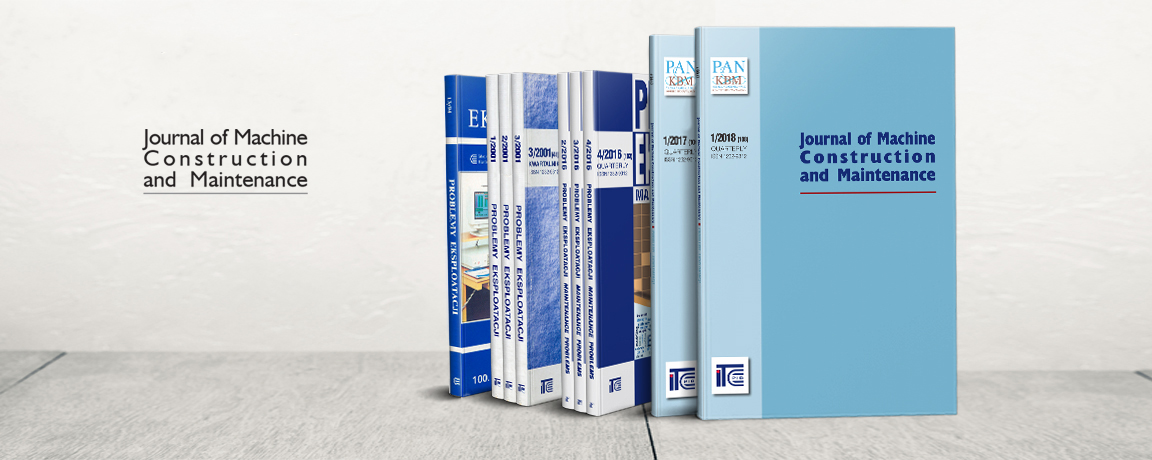"Journal of Machine Construction and Maintenance" follows strict ethical rules. Everyone involved in the journal is required to respect them. Journal’s Publication Ethics and Publication Malpractice Statement is based, in large part, on the guidelines and standards developed by the Committee on Publication Ethics (COPE). The relevant duties and expectations of authors, reviewers, and editors of the journal are set out below.
Duties and responsibilities of editors
Publication decisions
The editor is responsible for deciding which of the papers submitted to the journal will be published. The editor will evaluate manuscripts without regard to the authors' race, gender, sexual orientation, religious belief, ethnic origin, citizenship, or political philosophy. The decision will be based on the paper’s importance, originality and clarity, and the study’s validity and its relevance to the journal's scope. Current legal requirements regarding libel, copyright infringement, and plagiarism should also be considered.
Confidentiality
The editor and any editorial staff must not disclose any information about a submit ted manuscript to anyone other than the corresponding author, reviewers, potential reviewers, other editorial advisers, and the publisher, as appropriate.
Disclosure and conflicts of interest
Unpublished materials disclosed in a submitted paper will not be used by the editor or the members of the editorial board for their own research purposes without the author's explicit written consent.
Procedures for dealing with unethical behaviour
Unethical behaviour may be identified and brought to the attention of the editor and publisher at any time, by anyone. Whoever informs the editor or publisher of such conduct should provide sufficient information and evidence in order for an investigation to be initiated. All allegations should be taken seriously and treated in the same way, until a successful decision or conclusion is reached. Every reported act of unethical publishing behavior must be looked into, even if it is discovered years after publication.
The editor should take reasonably responsive measures when ethical complaints have been presented concerning a submitted manuscript or published paper, in conjunction with the publisher. Such measures will generally include contacting the author of the manuscript or paper and giving due consideration of the respective complaint or claims made, but may also include further communications to the relevant institutions and research bodies, depending on the misconduct seriousness.
Minor misconduct might be dealt with without the need to consult more widely. In any event, the author should be given the opportunity to respond to any allegations.
Serious misconduct might require application of one or more following measures:
- Informing or educating the author or reviewer where there appears to be a misunderstanding or misapplication of acceptable standards.
- Publication of a formal notice detailing the misconduct.
- A formal letter to the head of the author's or reviewer's department or funding agency.
- Formal retraction or withdrawal of a publication from the journal, in conjunction with informing the head of the author or reviewer's department.
- Imposition of a formal embargo on contributions from an individual for a defined period.
Duties and responsibilities of authors
Reporting standards
Authors of original research reports should present an accurate account of the work performed as well as an objective discussion of its significance. Underlying data should be represented accurately in the paper. A paper should contain sufficient detail and references to permit others to replicate the work. Fraudulent or knowingly inaccurate statements constitute unethical behavior and are unacceptable.
Originality and plagiarism
Authors will submit only entirely original works, and will appropriately cite or quote the work and/or words of others. Publications that have been influential in determining the nature of the reported work should also be cited. Plagiarism takes many forms, from „passing off‟ another´s paper as the author´s own paper, to copying or paraphrasing substantial parts of another´s paper (without attribution), to claiming results from research conducted by others. Plagiarism in all its forms constitutes unethical publishing behaviour and is unacceptable.
Multiple, redundant or concurrent publication
An author should not in general publish manuscripts describing essentially the same research in more than one journal or primary publication. Submitting the same manuscript to more than one journal concurrently constitutes unethical publishing behaviour. In general, an author should not submit for consideration in another journal a previously published paper.
Authorship of the paper
Authorship should be limited to those who have made a significant contribution to the conception, design, execution, or interpretation of the reported study. All those who have made significant contributions should be listed as co-authors. Where there are others who have participated in certain substantive aspects of the research project, they should be acknowledged or listed as contributors. The corresponding author should ensure that all appropriate co-authors and no inappropriate co-authors are included on the paper, and that all co-authors have seen and approved the final version of the paper and have agreed to its submission for publication.
Disclosure and conflicts of interest
All authors should include a statement disclosing any financial or other substantive conflicts of interest that may be construed to influence the results or interpretation of their manuscript. All sources of financial support for the project should be disclosed.
Fundamental errors in published works
When an author discovers a significant error or inaccuracy in his/her own published work, it is the author´s obligation to promptly notify the journal editor or publisher and cooperate with the editor to retract or correct the paper. If the editor or the publisher learns from a third party that a published work contains a significant error, it is the obligation of the author to promptly retract or correct the paper or provide evidence to the editor of the correctness of the original paper.
Duties and responsibilities of reviewers
Contribution to editorial decisions
Peer review assists the editor in making editorial decisions and through the editorial communications with the author may also assist the author in improving the paper. Peer review is an essential component of formal scholarly communication. Authors who wish to contribute to publications have an obligation to do a fair share of reviewing.
Promptness
Any selected referee who feels unqualified to review the research reported in a manuscript or knows that its prompt review will be impossible should notify the editor and excuse himself from the review process.
Confidentiality
Any manuscripts received for review must be treated as confidential documents. They must not be shown to or discussed with others except as authorized by the editor.
Standards of objectivity
Reviews should be conducted objectively. Personal criticism of the author is inappropriate. Referees should express their views clearly with supporting arguments.
Acknowledgement of sources
Reviewers should identify relevant published work that has not been cited by the authors. Any statement that an observation, derivation, or argument had been previously reported should be accompanied by the relevant citation. A reviewer should also call to the editor's attention any substantial similarity or overlap between the manuscript under consideration and any other published paper of which they have personal knowledge.
Disclosure and conflict of interest
Unpublished materials disclosed in a submitted manuscript must not be used in a reviewer´s own research without the written consent of the author. Privileged information or ideas obtained through peer review must be kept confidential and not used for personal advantage. Reviewers should not consider manuscripts in which they have conflicts of interest resulting from competitive, collaborative, or other relationships or connections with any of the authors, companies, or institutions connected to the papers.



